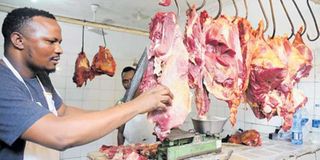Quick profits put health of meat users in jeopardy

A meat vendor at work at Buguruni Market, Ilala Municipality in Dar es Salaam Region. A new report says meat consumers in Tanzania are less concerned about how an animal is treated before it lands on their table as food. photo | file
What you need to know:
- World Animal Protection says it is the right of a consumer to demand for antibiotic free meat because at the end of the day they are the ones who have to suffer the consequences.
Dar es Salaam. The search for quick super profits is driving some animal keepers into using underhand methods which in the long run affect the quality of their products.
The World Animal Protection says there are commercial implications when animals and birds are not well taken care of-because the welfare of animals is closely linked to that of human beings.
Dr Victor Yamo, a campaign manager for Animals in Farming for World Animal Protection, believes that consumers are willing to pay more if they are assured that the meat products are free from chemical substances, including antibiotics; which are used in transporting and raising the animals and how they are ultimately slaughtered.
He says it is the right of the consumers to demand for antibiotic free meat because at the end of the day they are the ones who have to suffer the consequences.
A recent study shows that meat consumers in Tanzania ranked poorly on animal welfare and food safety issues compared to its neighbours according to a report by World Animal Protection.
The report entitled “Consumers perceptions on animal welfare and food safety” shows that meat consumers in Tanzania are less concerned about how an animal is treated before it lands on their table as food.
The survey indicates that 37.2 percent of the Tanzanians who participated in the study do not consider meat being free from chemical contamination as important.
Similarly, 54.37 per cent of the participants did not consider how the animal is raised as being important while 60.7 and 56.8 percent did not consider the welfare of the animal during transportation and slaughter to be important.
The report further shows that 53.3 per cent were able to link the use of antibiotics in farming systems to poor welfare within the production system and 79.4 per cent of the respondents knew that antibiotics in the meat had a negative impact on the health of the consumers.
Some 87.8 percent of the consumers were able to connect poor animal welfare to poor quality of meat that ends on their plates while 61.8% were willing to pay more for meat that is produced in high welfare.
In addition, 71.4 percent of people interviewed would stop sourcing and tell their family and friends to stop sourcing meat if they knew supermarkets sourced meat products from poor animal welfare producers.
The survey, according to Dr Yamo, points to a significant need for enhanced education and sensitisation of Tanzanian consumers on animal welfare and the correlation between how animals are raised and the quality of the meat that ends up on their tables.
The indiscriminate use of antibiotics in farm animals has led to proliferation of antimicrobial resistance and development of superbugs which has had serious impact on human health. He noted that it was important that producers and key players along the meat value chain adopted high welfare production systems.




